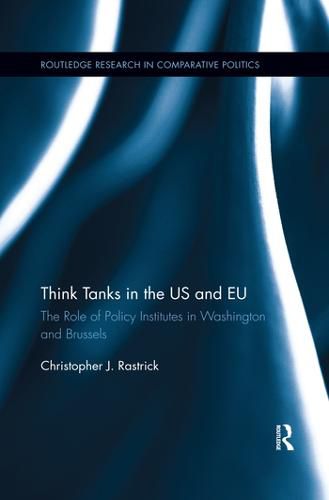Readings Newsletter
Become a Readings Member to make your shopping experience even easier.
Sign in or sign up for free!
You’re not far away from qualifying for FREE standard shipping within Australia
You’ve qualified for FREE standard shipping within Australia
The cart is loading…






Why do US and EU think tanks diverge in their roles, priorities, and main constituencies? Providing the first substantive analytical comparison of think tanks in Washington and Brussels, this book explores the differences that exist and why they developed.
Two principal variables are identified - institutional credibility and political culture - as a measure of comparison between the two think tank models. Supranational think tanks have an inherent credibility with the institutions of the EU, which allows them to direct their resources and efforts to activities and outputs where they hold a comparative advantage. US think tanks lack such institutional recognition and so need to prove their credibility to their main constituencies. The result is that an adversarial and individualistic political culture has informed the norms and activities of Washington think tanks while the consensus-driven and collectivist political culture of Europe has influenced supranational think tanks. Think tanks are far from newcomers to the public policy scene, but our broader understanding of their role, structure and how they assess their own achievements is not yet fully developed.
By providing a framework within which to analyse this, this book will be of interest to academics, students and policy experts working within public policy, comparative politics and political science more generally.
$9.00 standard shipping within Australia
FREE standard shipping within Australia for orders over $100.00
Express & International shipping calculated at checkout
Why do US and EU think tanks diverge in their roles, priorities, and main constituencies? Providing the first substantive analytical comparison of think tanks in Washington and Brussels, this book explores the differences that exist and why they developed.
Two principal variables are identified - institutional credibility and political culture - as a measure of comparison between the two think tank models. Supranational think tanks have an inherent credibility with the institutions of the EU, which allows them to direct their resources and efforts to activities and outputs where they hold a comparative advantage. US think tanks lack such institutional recognition and so need to prove their credibility to their main constituencies. The result is that an adversarial and individualistic political culture has informed the norms and activities of Washington think tanks while the consensus-driven and collectivist political culture of Europe has influenced supranational think tanks. Think tanks are far from newcomers to the public policy scene, but our broader understanding of their role, structure and how they assess their own achievements is not yet fully developed.
By providing a framework within which to analyse this, this book will be of interest to academics, students and policy experts working within public policy, comparative politics and political science more generally.